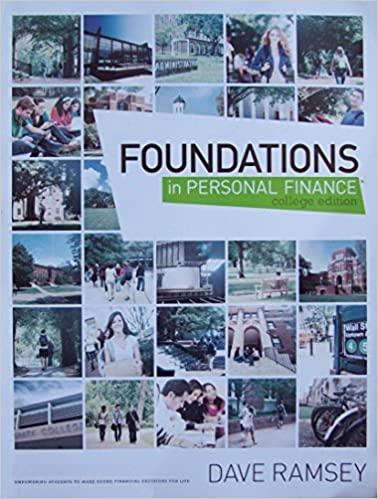Question
You are considering the purchase of one of two machines used in your manufacturing plant. Machine A has a life of two years, costs $1500
You are considering the purchase of one of two machines used in your manufacturing plant. Machine A has a life of two years, costs $1500 initially, and then $400 per year in maintenance costs. Machine B costs $2000 initially, has a life of three years, and requires $300 in annual maintenance costs. Either machine must be replaced at the end of its life with an equivalent machine. Which is the better machine for the firm? The discount rate is 6% and the tax rate is zero.
| Year | 0 | 1 | 2 | 3 |
| Machine A's Cash Flows |
|
|
|
|
| Machine B's Cash Flows |
|
|
|
|
| Machine A's EAC |
|
| Machine B's EAC |
|
Which machine do you choose? Explain.
Capital Budgeting Exercise 2
Your company has spent $250,000 on research to develop a new computer game. The firm is planning to spend $1,400,000 on a machine to produce the new game. Shipping and installation costs for the new machine total $200,000 and these costs will be capitalized and depreciated together with the cost of the machine. The machine will be used for 3 years, has a $200,000 estimated resale value at the end of three years, and will be depreciated straight line over 4 years. Revenue from the new game is expected to be $1,200,000 per year, with costs of $500,000 per year. The firm has a tax rate of 35 percent, a cost of capital (discount rate) of 6 percent, and it expects net working capital (NWC) to increase by $150,000 at the beginning of the project. This investment in NWC will be wholly recouped at the end of the project.
a) Complete the table below.
b) In the second table below calculate the Net Present Value (NPV) of the project.
c) Calculate the Profitability Index (PI) of the project.
d) Is the Internal Rate of Return (IRR) of the project greater than, equal to, or less than the cost of capital (discount rate)?
e) Should your company proceed with this project? Explain based on the decision criteria for NPV, PI, and IRR.
Year 0 1 2 3
Revenue
Cost
Net Present Vaule
Depreciation
EBIT
Taxes
Net Icome
Operating Cash Flow
Change in Net Operating Working Captial
Change in Gross Fixed Assets
Total Free Cash Flow
Profitability Index
Internal Rate of Return >. = or < the cost of captial
Proceed with the Project? Explain
Step by Step Solution
There are 3 Steps involved in it
Step: 1

Get Instant Access to Expert-Tailored Solutions
See step-by-step solutions with expert insights and AI powered tools for academic success
Step: 2

Step: 3

Ace Your Homework with AI
Get the answers you need in no time with our AI-driven, step-by-step assistance
Get Started


